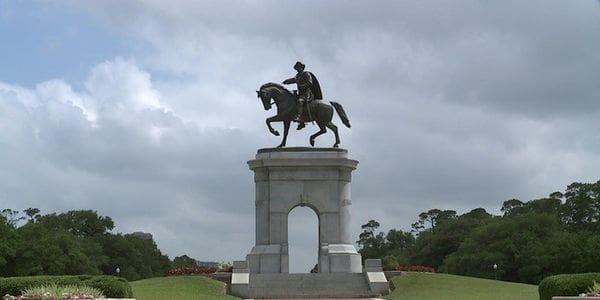Before lawmakers even arrived in Austin for the 86th Texas Legislative Session, one issue was already at the forefront: monuments and memorials.
Across the nation, far-left activists and their allies in the media began active campaigns demanding they be removed from public spaces. In cities and schools nationwide, including Texas cities like Dallas and Houston, historical statues and streets dedicated to former Confederate General Robert E. Lee were torn down and renamed.
The Texas Conservative Grassroots Coalition summarized the situation in a letter signed by 130 grassroots leaders and sent to lawmakers in March.
“Just like the Taliban, the radical Left is bent on destroying religious monuments and statues all across America. These monuments range from military veterans’ memorials to the founding spiritual figures and murals in Ivy League colleges. The Left’s appetite for censorship and groupthink has also expanded into secular historical representations of Christopher Columbus and Confederate statues and monuments.”
“Unfortunately, Texas has not escaped the Left’s purge of history. Urban areas such as Houston, Dallas, San Antonio, and Austin have targeted many Civil War era statues and monuments,” they added.
However, the cities mentioned in the letter were not the only ones under attack. At the Texas Capitol, activists and media entities focused their criticism toward the war memorials on the Capitol grounds and a plaque erected in 1959 by the Children of the Confederacy.
Democrat State Rep. Eric Johnson of Dallas had long insisted the plaque be removed, but Republicans had thus far resisted his efforts. The majority of grassroots voters wanted the plaque to stay.
However, newly elected House Speaker Dennis Bonnen (R–Angleton) sided with Johnson. He and his appointee to the State Preservation Board, State Rep. Jeff Leach (R–Plano), forced the issue to a vote and were successful in ensuring the plaque be taken down.
“I’m grateful to Speaker Bonnen for appointing me to the State Preservation Board, and I was proud this morning to vote alongside him, Gov. Abbott, and Lt. Gov. Patrick to ensure the swift removal of the Children of the Confederacy Plaque,” Leach said in a statement.
“Today is a good day,” he added.
Sharing a photo of the Preservation Board on Facebook, the Northeast Tarrant Tea Party’s Fred McCarty summed up the sentiment of many grassroots Texans.
“If they can’t save some little plaque how are they going to save Texas?” wrote McCarty. “I don’t agree with everything on the plaque but I’d never surrender any ground just because I’m afraid of being called a racist. They’re going to call you that anyway…If you are an effective Republican. Time To Toughen up.”
In light of the ongoing controversy, a few lawmakers did introduce legislation to preserve and protect historical monuments.
State Sen. Pat Fallon (R–Little Elm) filed Senate Bill 226 which would prohibit the removal of a monument or the renaming of public buildings without a vote of the people. It died without a hearing in the Texas Senate Committee on State Affairs chaired by Joan Huffman (R–Houston).
It’s companion, House Bill 2648 by State Rep. Kyle Biedermann (R–Fredericksburg), died in the House Committee on Culture, Recreation, & Tourism chaired by State Rep. John Cyrier (R–Lockhart) without ever being voted on.
Another proposal was House Bill 583 by State Rep. James White, a black Republican from East Texas. His bill would require two-thirds of members in both legislative chambers to approve of the removal, relocation, or alteration of monuments or memorials that have been on state property for more than 25 years.
Local government-owned monuments that have been up for at least 25 years could only be removed, relocated, or altered if approved by a supermajority of the governing board.
Slow-rolled by Cyrier, the legislation was languishing without a hearing. However, House conservatives weren’t without options.
Supporters of the legislation led by State Rep. Briscoe Cain (R–Deer Park) realized the substance of the bill could be offered as an amendment to legislation reauthorizing the Texas Historical Commission. They planned to tack the bill on, but they were persuaded not to do so by the House leadership team which offered to advance White’s legislation instead.
In other words, Cain had a bird in the hand . . . and traded it away for one in the bush.
True to their word, House leadership did advance White’s bill out of the Culture, Recreation, & Tourism Committee . . . then simply never voted to pass it out of the House Calendars Committee—effectively killing the bill.
Meanwhile, conservative lawmakers were still trying to pass the companion to White’s legislation, SB 1663 by State Sen. Brandon Creighton (R–Conroe).
Perhaps knowing Creighton’s legislation would meet the same fate as Fallon’s legislation if it were to be referred to the State Affairs Committee, Lt. Gov. Dan Patrick instead referred the bill to the Committee on Natural Resources & Economic Development chaired by Brian Birdwell (R–Granbury).
That committee held a hearing on the bill in April, where it was one of very few grassroots-supported bills in which the number of individuals testifying in favor of the legislation exceeded those testifying against. (Grassroots conservatives routinely lose this fight as lobbyists and liberal individuals often have an easier time testifying on legislation in Austin.)
The bill passed out of committee by a vote of 6-4, and then citizen pressure was successful in pushing lawmakers to provide enough votes to get it to the Senate floor.
“Our history is part of who we are and part of the story of Texas, but history is never just one person’s account,” Creighton said as he argued in support of the legislation on the floor of the Texas Senate.
“We’ve seen a trend across the nation and the world where controversial monuments are removed or destroyed, often without any input, study, or process. I fear that we’ll look back and regret that this was a period where deleting history was more important than learning from it,” he said.
Shortly thereafter, Creighton’s legislation passed the Texas Senate on a 19-12 vote.
But despite making it through one chamber, SB 1663 never made it to Gov. Greg Abbott’s desk. It was delayed in the House by Speaker Dennis Bonnen, delayed by John Cyrier (R–Lockhart), and then never placed on a calendar by State Rep. Four Price (R–Amarillo).





